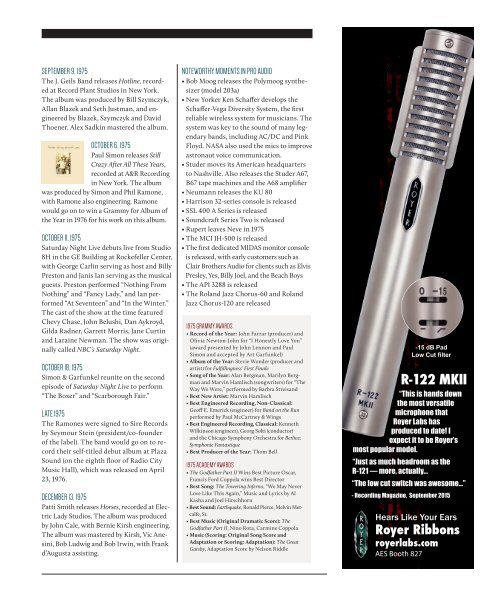Create successful ePaper yourself
Turn your PDF publications into a flip-book with our unique Google optimized e-Paper software.
SEPTEMBER 9, 1975<br />
The J. Geils Band releases Hotline, recorded<br />
at Record Plant Studios in New York.<br />
The album was produced by Bill Szymczyk,<br />
Allan Blazek and Seth Justman, and engineered<br />
by Blazek, Szymczyk and David<br />
Thoener. Alex Sadkin mastered the album.<br />
OCTOBER 6, 1975<br />
Paul Simon releases Still<br />
Crazy After All These Years,<br />
recorded at A&R Recording<br />
in New York. The album<br />
was produced by Simon and Phil Ramone,<br />
with Ramone also engineering. Ramone<br />
would go on to win a Grammy for Album of<br />
the Year in 1976 for his work on this album.<br />
OCTOBER 11, 1975<br />
Saturday Night Live debuts live from Studio<br />
8H in the GE Building at Rockefeller Center,<br />
with George Carlin serving as host and Billy<br />
Preston and Janis Ian serving as the musical<br />
guests. Preston performed “Nothing From<br />
Nothing” and “Fancy Lady,” and Ian performed<br />
“At Seventeen” and “In the Winter.”<br />
The cast of the show at the time featured<br />
Chevy Chase, John Belushi, Dan Aykroyd,<br />
Gilda Radner, Garrett Morris, Jane Curtin<br />
and Laraine Newman. The show was originally<br />
called NBC’s Saturday Night.<br />
OCTOBER 18, 1975<br />
Simon & Garfunkel reunite on the second<br />
episode of Saturday Night Live to perform<br />
“The Boxer” and “Scarborough Fair.”<br />
LATE 1975<br />
The Ramones were signed to Sire Records<br />
by Seymour Stein (president/co-founder<br />
of the label). The band would go on to record<br />
their self-titled debut album at Plaza<br />
Sound (on the eighth floor of Radio City<br />
Music Hall), which was released on April<br />
23, 1976.<br />
DECEMBER 13, 1975<br />
Patti Smith releases Horses, recorded at Electric<br />
Lady Studios. The album was produced<br />
by John Cale, with Bernie Kirsh engineering.<br />
The album was mastered by Kirsh, Vic Anesini,<br />
Bob Ludwig and Bob Irwin, with Frank<br />
d’Augusta assisting.<br />
NOTEWORTHY MOMENTS IN PRO AUDIO<br />
• Bob Moog releases the Polymoog synthesizer<br />
(model 203a)<br />
• New Yorker Ken Schaffer develops the<br />
Schaffer-Vega Diversity System, the first<br />
reliable wireless system for musicians. The<br />
system was key to the sound of many legendary<br />
bands, including AC/DC and Pink<br />
Floyd. NASA also used the mics to improve<br />
astronaut voice communication.<br />
• Studer moves its American headquarters<br />
to Nashville. Also releases the Studer A67,<br />
B67 tape machines and the A68 amplifier<br />
• Neumann releases the KU 80<br />
• Harrison 32-series console is released<br />
• SSL 400 A Series is released<br />
• Soundcraft Series Two is released<br />
• Rupert leaves Neve in 1975<br />
• The MCI JH-500 is released<br />
• The first dedicated MIDAS monitor console<br />
is released, with early customers such as<br />
Clair Brothers Audio for clients such as Elvis<br />
Presley, Yes, Billy Joel, and the Beach Boys<br />
• The API 3288 is released<br />
• The Roland Jazz Chorus-60 and Roland<br />
Jazz Chorus-120 are released<br />
1975 GRAMMY AWARDS<br />
• Record of the Year: John Farrar (producer) and<br />
Olivia Newton-John for “I Honestly Love You”<br />
(award presented by John Lennon and Paul<br />
Simon and accepted by Art Garfunkel)<br />
• Album of the Year: Stevie Wonder (producer and<br />
artist) for Fulfillingness’ First Finale<br />
• Song of the Year: Alan Bergman, Marilyn Bergman<br />
and Marvin Hamlisch (songwriters) for “The<br />
Way We Were,” performed by Barbra Streisand<br />
• Best New Artist: Marvin Hamlisch<br />
• Best Engineered Recording, Non-Classical:<br />
Geoff E. Emerick (engineer) for Band on the Run<br />
performed by Paul McCartney & Wings<br />
• Best Engineered Recording, Classical: Kenneth<br />
Wilkinson (engineer), Georg Solti (conductor)<br />
and the Chicago Symphony Orchestra for Berlioz:<br />
Symphonie Fantastique<br />
• Best Producer of the Year: Thom Bell<br />
1975 ACADEMY AWARDS<br />
• The Godfather Part II Wins Best Picture Oscar,<br />
Francis Ford Coppola wins Best Director<br />
• Best Song: The Towering Inferno, “We May Never<br />
Love Like This Again,” Music and Lyrics by Al<br />
Kasha and Joel Hirschhorn<br />
• Best Sound: Earthquake, Ronald Pierce, Melvin Metcalfe,<br />
Sr.<br />
• Best Music (Original Dramatic Score): The<br />
Godfather Part II, Nino Rota, Carmine Coppola<br />
• Music (Scoring: Original Song Score and<br />
Adaptation or Scoring: Adaptation): The Great<br />
Gatsby, Adaptation Score by Nelson Riddle


